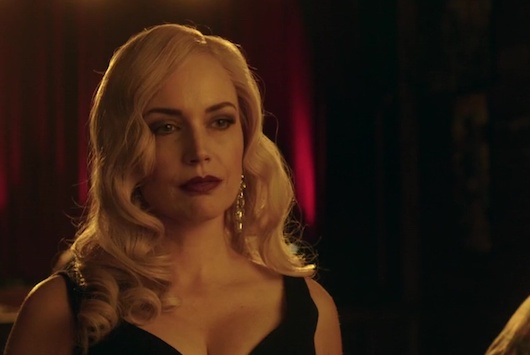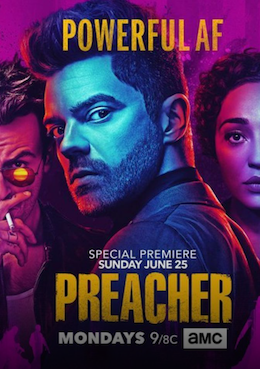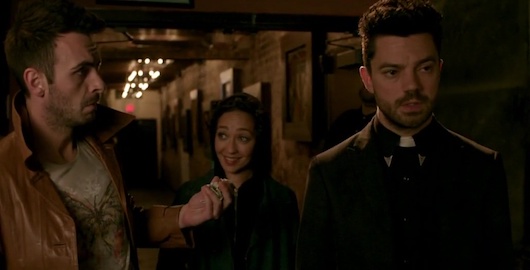
Prayer for the Dying
by ETHAN PETERSON
Preacher
creators Sam Catlin, Seth Rogen & Evan Goldberg
AMC
 "Wouldn't it be great," said no one ever, "if we introduced the entire cast of a rural Texas town, and then savagely murdered them at the end of an anticlimactic first season of this adaptation of a graphic novel no one in their right mind has ever read to completion?" Garth Ennis' writing on his long-form comic Preacher always paled to his run on The Punisher. The difference between the two stories was crucial: one story, Preacher, believed that it was hilarious, and the other took itself seriously.
"Wouldn't it be great," said no one ever, "if we introduced the entire cast of a rural Texas town, and then savagely murdered them at the end of an anticlimactic first season of this adaptation of a graphic novel no one in their right mind has ever read to completion?" Garth Ennis' writing on his long-form comic Preacher always paled to his run on The Punisher. The difference between the two stories was crucial: one story, Preacher, believed that it was hilarious, and the other took itself seriously.
Preacher was not hilarious, and decades after its original publication the shock value has largely worn off as well. Sadly, the same is true of this second season of Preacher, airing on AMC. Through three episodes of this generic gods and monsters story, there has been exactly one moment worth savoring. Jesse Custer (Dominic Cooper) is wandering aimlessly around New Orleans, which looks something like a sewer. He asks everyone he sees if they know where God is, and boy does he ask a lot of people this. Amazingly, no one wants to talk about the subject with Jesse, which runs counter to my experience of the American South.
Eventually he arrives at a bartender eager to help him find God. They take him to the basement, where a card-carrying member of the AARP hands him a blue dildo and shows him this:

You see God is Dog backwards. This would maybe be good for half a laugh, except Preacher refers to this knee-slapper like three more times. This humorous moment was preceded by the intro to the episode, wherein a teen girl shot herself in the head with a shotgun because she kissed a friend of hers.
Preacher had an intriguing slate of characters they decided to kill off; I still don't quite understand why they thought it was necessary to do this so soon. Lucy Griffiths played this really attractive churchgoer, for example. We are left with Jesse's two traveling companions: Tulip (Ruth Negga) who would be somewhat interesting if she were not hopelessly devoted to Jesse already, and the vampire Cassidy (Joseph Gilgun) who transparently explains every single emotion and thought that comes into his head. These two dullards turn Preacher into the biggest snoozefest of a road trip you can imagine.

Included to spice things up are Jesse's various enemies, who virtually all resemble caricatures of Nazis. It's weird to see the malefactors that Ennis came up with, since the villains of The Punisher are all very subtle: a whoremaster with a nose for business, a Soviet general with a novel concept of patriotism, a fearful, homosexual spy. I can think of many plausible enemies of God, but the only ones who could really manifest themselves as a threat to Him are human, since they cannot conceive of the fullness of His existence.

Instead a litany of angels and demons are paraded before us. They cannot die, but they can be rendered inert, like a dangerous gas. They have no individual agency that could lead to a meaningful choice; instead their are destined to have problems identical to those they sought to overcome at the moment of their creation. This gives Preacher all the narrative momentum of a Saturday morning cartoon series.
Jesse's essential power, of course, is that he can make any human being do exactly as he wishes. This is a gimmick entertaining for a scene or maybe half a scene. Sometimes his instructions have slightly unintended consequences, but mostly they afford him a slight advantage in combat or a way to put an end to any pending negotiation. How they turned the idea of a reverend who could fight and have sex into such a boring production I will never fully understand.
Ethan Peterson is the reviews editor of This Recording.
